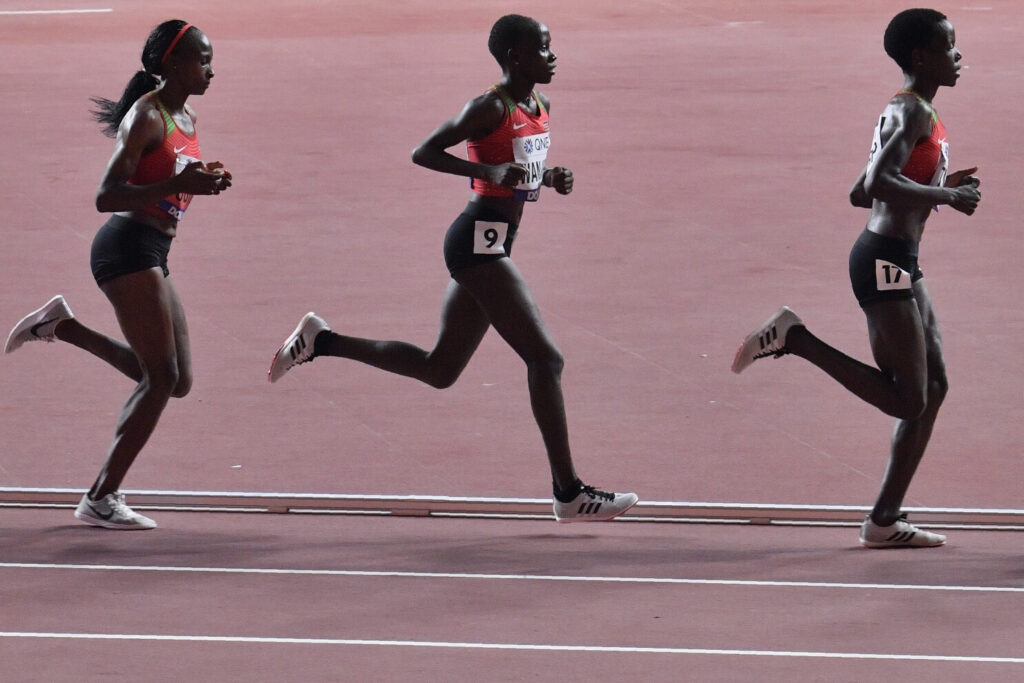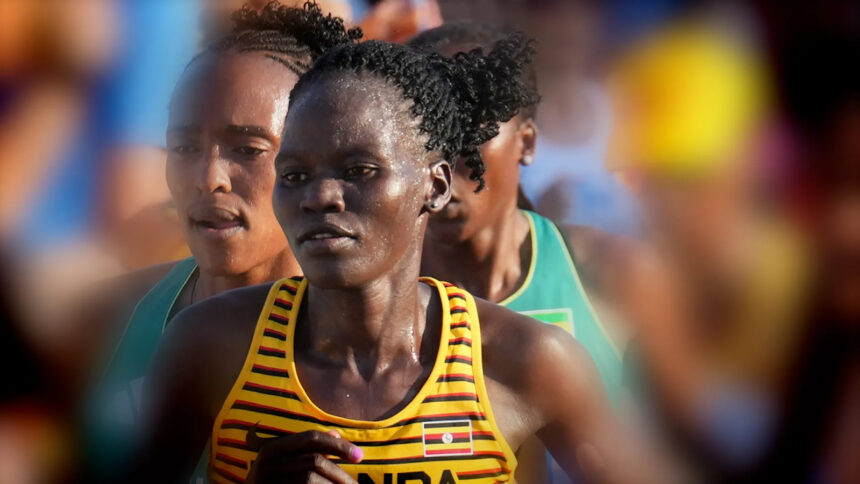On September 1, 2024, the world of athletics was rocked by a tragic event that underscored a persistent and disturbing issue: gender-based violence. Rebecca Cheptegei, a highly respected Ugandan marathon runner who competed in the recent Paris Olympics, was brutally attacked by her former boyfriend. This devastating incident has cast a spotlight on the alarming issue of violence against women, particularly within the realm of sports. This extended blog explores Cheptegei’s life and achievements, the circumstances of her death, and the broader implications for gender-based violence in sports and society at large.
The Life and Career of Rebecca Cheptegei
Rebecca Cheptegei’s journey from a young athlete in Uganda to an internationally recognized marathon runner is a testament to her dedication and resilience. Born in the mountainous region of Uganda, Cheptegei developed an early passion for long-distance running. Her commitment to the sport was evident from a young age, and her natural talent quickly became apparent.
Cheptegei’s career was marked by numerous significant achievements. She gained international recognition for her performance at the World Mountain and Trail Running Championships in Chiang Mai, Thailand, in 2022, where she won a gold medal. Her victory was a source of immense pride for Uganda and highlighted her as one of the top long-distance runners in the world.
In addition to her success on the track, Cheptegei was known for her generosity and support of fellow athletes. Her commitment to helping others extended beyond financial support; she was a mentor and a source of encouragement for many in the athletics community. Fellow runners, including James Kirwa, have spoken highly of her kindness, noting how she provided financial assistance and even gifted training shoes to her peers.
Cheptegei’s dedication to her sport and her community made her a beloved figure both in Uganda and internationally. Her achievements were not just a testament to her skill but also to her character and the positive impact she had on those around her.
The Tragic Incident

The horrific event that led to Rebecca Cheptegei’s death unfolded on September 1, 2024, in Endebess town, Trans-Nzoia county, Kenya. Cheptegei was returning home from church with her two young daughters when she was attacked by her former boyfriend, Dickson Marangach.
Marangach, reportedly involved in a dispute with Cheptegei over a piece of land, doused her in petrol and set her on fire. The attack was premeditated and particularly brutal, resulting in extensive burns covering more than 80% of Cheptegei’s body. The severity of the injuries necessitated immediate medical attention, and Cheptegei was rushed to the Moi Teaching and Referral Hospital in Eldoret city.
Despite the efforts of medical professionals, Cheptegei’s condition was dire. She suffered from severe burns that led to multiple organ failure. The hospital staff did all they could to save her, but the extent of her injuries proved fatal. Cheptegei passed away on September 5, 2024, just four days after the attack.
Marangach, who also suffered burns in the attack, was admitted to the same hospital. His condition was less severe than Cheptegei’s, but he remained in intensive care. The circumstances of the attack and the ensuing investigation have drawn significant attention and condemnation from both the public and authorities.
The Broader Context of Gender-Based Violence
Rebecca Cheptegei’s tragic death highlights a broader and deeply troubling issue: gender-based violence. This form of violence, which disproportionately affects women, is a pervasive problem that transcends borders and impacts individuals from all walks of life, including elite athletes.
In Kenya, where Cheptegei lived and trained, gender-based violence is a significant concern. A 2022 national survey revealed that at least 34% of women had experienced physical violence. This statistic reflects a broader pattern of violence that affects many women in Kenya and beyond. The prevalence of gender-based violence is not confined to any particular group or status; it affects women across different social, economic, and professional backgrounds.
The violence experienced by Cheptegei and other female athletes is part of a troubling pattern within the sports community. The deaths of Kenyan runners Agnes Tirop and Damaris Mutua, both killed by their partners, underscore a disturbing trend. Tirop was murdered in October 2021 by her husband, Ibrahim Rotich, while Mutua was strangled in April 2022 by her boyfriend, Koki Fai, who remains at large.
These incidents are not isolated but rather part of a larger issue of violence against women. The fact that even highly successful and publicly celebrated women are not immune to such violence speaks to the systemic nature of the problem. Addressing gender-based violence requires comprehensive efforts, including legal reforms, public awareness campaigns, and support systems for victims.
Reactions and Tributes

The response to Rebecca Cheptegei’s death has been one of profound sadness and outrage. The loss of such a talented and generous athlete has resonated deeply within the sports community and beyond.
In Uganda, where Cheptegei was a national hero, her death has been met with widespread grief. Uganda’s Sports Minister Peter Ogwang expressed condolences and highlighted the need for justice. He acknowledged the impact of Cheptegei’s death on her family and the nation. The country has united in mourning her loss and calling for action against gender-based violence.
Kenya’s Sports Minister Kipchumba Murkomen also weighed in, describing the incident as a “stark reminder” of the urgent need to address gender-based violence. His comments reflect a broader recognition of the issue and a call for increased efforts to combat violence against women.
The United Nations has also condemned the violence, with spokesperson Stephane Dujarric expressing strong condemnation and calling for action. The involvement of international organizations underscores the global significance of the issue and the need for a coordinated response.
Within the athletics community, tributes have poured in from fellow athletes and sports figures. British Olympian Eilish McColgan expressed her sorrow and highlighted the ongoing problem of violence against female athletes. The support from the global sports community reflects a collective recognition of the need to address these issues and support those affected.
Cheptegei’s family, particularly her father Joseph Cheptegei, has been vocal in their calls for justice. Joseph Cheptegei described his daughter as “very supportive” and expressed his grief over the loss. He also voiced concerns about the future of Cheptegei’s two young daughters, emphasizing the impact of the tragedy on her family.
The Implications for the Sports Community
Rebecca Cheptegei’s death has profound implications for the sports community. Female athletes, who are often seen as symbols of strength and resilience, are not immune to the challenges faced by women in society. The violence experienced by Cheptegei and others highlights the need for greater awareness and action within the sports community.
The sports world must confront the uncomfortable reality that gender-based violence affects even the most celebrated athletes. This recognition is crucial for developing effective support systems and interventions. Initiatives like Tirop’s Angels, founded by Kenyan athlete Joan Chelimo, aim to raise awareness and provide support for women facing violence. However, more needs to be done to create safe spaces and support networks for female athletes.
The sports community must also advocate for legal and social reforms to address and prevent gender-based violence. This includes ensuring that perpetrators are held accountable and that victims receive the support they need. Collaboration between sports organizations, governments, and community groups is essential for creating a safer environment for female athletes.
The Role of the International Community
The international community has a critical role to play in addressing gender-based violence. Global organizations, sports federations, and advocacy groups must continue to highlight and address these issues. Public awareness campaigns, educational programs, and policy reforms are essential components of a comprehensive approach to combating violence.
Cheptegei’s death serves as a poignant reminder of the need for global solidarity in the fight against gender-based violence. It is a call to action for individuals and organizations to stand up against violence and support efforts to create a safer and more equitable world.
International organizations, including the United Nations, play a crucial role in raising awareness and advocating for change. Their involvement underscores the global significance of the issue and the need for a coordinated response. By working together, the international community can drive meaningful progress in addressing gender-based violence and supporting victims.
Addressing Gender-Based Violence: Steps Forward

To effectively address gender-based violence, a multifaceted approach is required. This includes legal reforms, public education, and support for victims. Key steps in this process include:
1. Legal Reforms
Strengthening legal frameworks to address gender-based violence is essential. This includes ensuring that laws are comprehensive and that perpetrators are held accountable. Legal reforms should also focus on improving the justice system’s response to violence and providing support for victims throughout the legal process.
2. Public Education
Raising awareness about gender-based violence is crucial for changing societal attitudes and behaviors. Public education campaigns can help challenge harmful stereotypes, promote respectful relationships, and encourage individuals to speak out against violence.
3. Support for Victims
Providing support for victims of gender-based violence is essential for their recovery and well-being. This includes access to medical care, counseling, and legal assistance. Support services should be accessible and responsive to the needs of survivors.
4. Collaboration and Advocacy
Collaboration between governments, sports organizations, and advocacy groups is vital for addressing gender-based violence. By working together, these groups can develop and implement effective strategies for prevention and support. Advocacy efforts can also help raise awareness and drive policy change.
Conclusion
The tragic death of Rebecca Cheptegei is a devastating loss for the world of athletics and a stark reminder of the pervasive issue of gender-based violence. Cheptegei’s life and career were marked by remarkable achievements, but her untimely death highlights the urgent need for action to address the systemic violence that affects women across the globe.
As we mourn the loss of a talented and generous athlete, it is crucial to reflect on the broader implications of her death and commit to meaningful change. Cheptegei’s story is a call to action for individuals, organizations, and governments to confront the issue of gender-based violence and work towards a safer, more equitable world.
By honoring Rebecca Cheptegei’s memory, we can ensure that her legacy extends beyond her athletic achievements. Let her life inspire us to take action, support victims, and create a world where such tragedies are no longer a reality.





